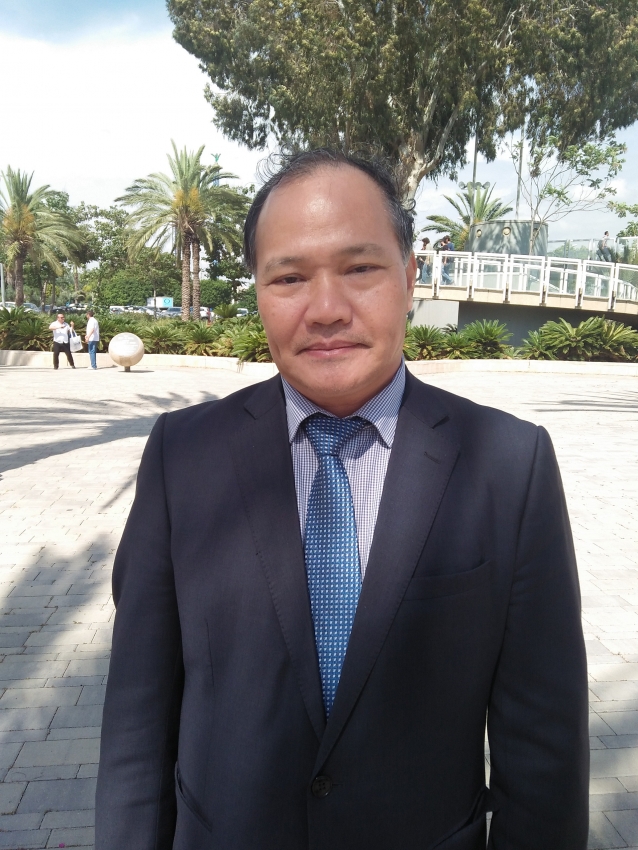Vietnam-Israel agricultural co-operation to see new breakthroughs
 |
| Hoang Van Thang, Deputy Minister of Agriculture and Rural Development |
How would you evaluate the prospects of agricultural investment co-operation between Vietnam and Israel?
The prospects are very good now. The agricultural sectors of the two nations complement each other. Israel has a modern and creative agricultural sector, with numerous achievements—especially in the context that we have always been facing droughts, water shortages, and a high level of desertification.
Israel has created an agricultural miracle, at all stages, including production of varieties and breeding, production of pesticides, irrigation, as well as processing and preserving products.
Vietnam also has great agricultural potential, with a record export turnover of $36.4 billion last year, which is expected to rise to $40.5 billion this year.
However, the Vietnamese agriculture remains limited in that its production achievements largely rely on using large land areas and manual labour. Meanwhile, the world has a growing demand for higher-value and higher-quality products.
Vietnam and Israel have had many successful investment co-operation projects, such as TH true MILK and Vineco. Many Vietnamese projects are effectively using Israeli technologies and machinery. Also, many Israeli investors and firms also perform well in Vietnam in irrigation and variety production, such as Hasfarm Da Lat and NaanDanJain.
In the new development framework, when the two countries are boosting the development of startups and agricultural projects, the Vietnamese government has enacted many new policies in favour of agricultural investment.
I do believe that in the time to come, the prospects of agricultural investment co-operation between Vietnam and Israel will be quite bright and see new breakthroughs, especially now that Vietnam is seeing a new wave of agricultural investment. This will help Vietnam successfully develop its own modern agricultural sector, with both enterprises and farmers being beneficiaries.
The Vietnamese government, the Ministry of Agriculture and Rural Development, and many other ministries and relevant agencies will issue new policies and closely co-operate with the Israeli government and related ministries and agencies to support the co-operation of both nations’ enterprises and investors.
You are attending the 20th International Agricultural Exhibition and Conference and have also met with many enterprises and leaders from Israeli ministries. What are their views on agricultural co-operation with Vietnam?
At this event, we have met with the ministries of Agriculture and Rural Development, Foreign Affairs, and Economy of Israel, and Israel's Agency for International Development (Mashav) to discuss solutions to boost the co-operation between the two nations’ enterprises.
We have also visited many institutions, projects, and enterprises of Israel to gain experience. Many enterprises and localities from the two countries have inked co-operation deals. I do believe that in the time to come, agricultural cooperation between Vietnam and Israel will see stronger development.
Are there obstacles preventing Vietnamese enterprises and farmers from applying high-technology from Israel, as many of them are limited in capital and skills?
Yes, obstacles remain. Enterprises and farmers are finding it difficult to approach high-technology from Israel. However, the government has recently promulgated Decree 57 on incentives for agricultural and rural investment, which replaces Decree 210/2013/ND-CP issued in 2013. This is a new breakthrough in agricultural policy. Besides, the government also passed a policy to offer preferential loans to agricultural projects. In the near future, the government will also enact a decree on supporting the development of irrigation works and water saving. I also believe that such policies will also create new breakthroughs in agricultural and rural development.
How will these policies help Vietnam in attracting more agricultural investment?
I believe that together with the effectiveness of these policies and enterprises’ growing absorption of modern technologies, as well as the domestic agricultural sector’s growing strength, Vietnam will be able to attract more investment.
However, in addition to great efforts made by private firms, the state would also need to invest more. Also, local firms need to improve their competitiveness if they want to lure in more foreign partners.
Israel is now one of the world’s brightest examples of high-tech agricultural development. What lessons can Vietnam learn from Israel?
Vietnam can learn many things from Israel. For example, it would need to have more new incentive policies for enterprises to conduct innovation and enhance creativity, and apply new technologies. From that, they can achieve better results which will benefit the state, businesses, and farmers as well.
What the stars mean:
★ Poor ★ ★ Promising ★★★ Good ★★★★ Very good ★★★★★ Exceptional
Related Contents
Latest News
More News
- Vietnamese businesses diversify amid global trade shifts (February 03, 2026 | 17:18)
- Consumer finance sector posts sharp profit growth (February 03, 2026 | 13:05)
- Vietnam and US to launch sixth trade negotiation round (January 30, 2026 | 15:19)
- NAB Innovation Centre underscores Vietnam’s appeal for tech investment (January 30, 2026 | 11:16)
- Vietnam moves towards market-based fuel management with E10 rollout (January 30, 2026 | 11:10)
- Vietnam startup funding enters a period of capital reset (January 30, 2026 | 11:06)
- Vietnam strengthens public debt management with World Bank and IMF (January 30, 2026 | 11:00)
- PM inspects APEC 2027 project progress in An Giang province (January 29, 2026 | 09:00)
- Vietnam among the world’s top 15 trading nations (January 28, 2026 | 17:12)
- Vietnam accelerates preparations for arbitration centre linked to new financial hub (January 28, 2026 | 17:09)

 Tag:
Tag:



















 Mobile Version
Mobile Version